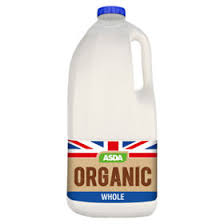6 easy swaps to organic this Organic September

It’s the last week of September, which means there’s only one week left to make the most of Soil Association’s Organic September and make simple, planet-saving swaps that don’t cost the earth.
From creating havens for wildlife, to healthier soils, reducing deforestation and lowering emissions, by going organic, you can have a direct impact that benefits the planet.
Want to switch to organic but don’t know where to start? Here are six easy, affordable organic swaps to make:
MILK
Wherever you shop, organic milk is now widely available. Organic milk and dairy contain around 50% more beneficial omega-3 essential fatty acids than non-organic, because organic cows are pasture-fed, meaning they graze on grass and clover, and are kept outside for as much of the year as possible.
EGGS
Organic eggs are an obvious swap as they are more than just free range – with chickens given much more space to roam and exhibit their natural behaviours, reducing stress, as well as dramatically reducing the use of antibiotics when they are farmed. Not only are eggs a great source of protein, but if you buy organic you can enjoy them without the guilt of wondering how the chickens who laid them lived.
CARROTS
Even if you don’t eat dairy or eggs, carrots are an easy, affordable and nutritious organic swap. In 2014, a team at Newcastle University found organic crops are up to 60% higher in a number of key antioxidants than conventionally-grown ones, so picking up a bunch of organic carrots is an easy way to ensure you’re getting as many nutrients as possible, as well as feeling confident that the soil they came from remains healthy even after the crops have been picked.
BEER & WINE
If you’re looking for a swap to make you feel good, opt for organic wine or prosecco – not only will you be supporting a more sustainable system of farming, you’ll also be consuming less sulphur – which is rumoured to lessen the chances of a hangover! If wine isn’t your thing, then there are some top-quality organic beers emerging, including a ‘Tomato Saison’ beer made from green tomatoes!
BEEF AND LAMB
Organic animals must graze outside whenever possible and they live truly free-range lives with the sun on their backs. Not only does this mean their quality of life is better, but it’s also better for the environment. Organic cows and sheep help to naturally fertilise farmland through their manure, helping to build healthy soils without the need for man-made, chemical fertilisers.
PULSES, PASTA & RICE
Whilst it is not an obvious first swap into organic, staples like pulses, pasta, rice and wholegrains are often the same price as non-organic, plus shoppers can bulk buy to help reduce the cost even further. We all use these staples regularly and often in big quantities, so this could make a real difference to the environment.
Want to know more about how organic can boost the environment?
A haven for wildlife: Organic farming avoids chemicals and wildlife thrives. Studies have shown that wildlife is 50% more abundant on organic farms because of the complete absence of manufactured herbicides and the severely restricted use of pesticides. A recent study found that if all of Europe used farming techniques like organic, it would remove the use of 380,000 tonnes of pesticides a year – the weight of nearly 30,000 double decker buses!
Healthy soils: Soil is amazing, and our survival depends on it – 95% of our food comes from it! A tablespoon of healthy soil holds about 10 billion organisms, and healthy, organic soils help prevent flooding and droughts, acting like a sponge to store as much as one and a half Olympic swimming pools of water per hectare. Sadly, we’re losing about 30 football pitches of fertile soil every minute because of industrial farming techniques.
Lowering your emissions: Healthy soils are also a major store of carbon, containing three times as much carbon as the atmosphere and five times as much as forests. Now the government has committed to net zero emissions by 2050, organic has a huge role to play. If all UK farming was converted to organic, at least 1.3 million tonnes of carbon would be taken up by the soil each year – the equivalent of taking nearly 1 million cars off the road!




